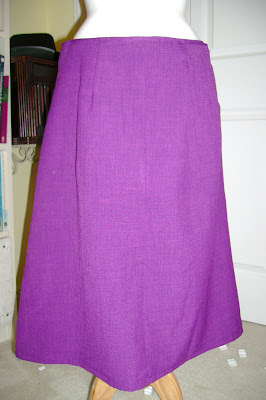
Well...I am an idiot. But at least I learned some valuable lessons with this one.
Lesson 1: Know your fabric.
Lesson 2: Mark the right side and wrong side of fabric when it's hard to tell.
Here's the story.
This was my first attempt at a vintage pattern. I saw a 1958 Marian Martin 9000 on ebay and had to have it. (Can someone with access to the Vintage Pattern Wiki upload this to the Marian Martin page? 9000 is not there yet.) I found some gorgeous bright violet linen-look fabric at JoAnn's. The store near me only had a yard left, so I drove 20 miles to the other end of town to get another three yards. I thought polyester would be easy to work with. I somehow totally overlooked the fact that it was a polyester WOVEN. Woven as in stretchy, and unravelly. It was a linen look for pete's sake. How did I miss that it was woven?!? Woven calls for binding seams, not lazily pinking them. And the stretch factor? Read on.
I cut the pattern out and started sewing. The instructions were fairly clear. I had a little trouble trying to figure out if I still needed to fold and stitch if I was using fusible instead of sew-on interfacing. Also, they didn't say anything about stay stitching, but I knew to do that. But the bodice stretched like crazy anyway. The top half was cut on the bias. Even with stay stitching and a needle meant for stretch it just wouldn't cooperate. The self-made bias tape around the armholes was especially bad. Instead of a nice clean line at the shoulder, I got stretched out wrinkly waves. But I continued on thinking I could fix it later.
While working on the skirt, I kept thinking how odd it was that the illustrations were backwards. When I got ready to attach the skirt to the bodice, I learned why. They weren't backwards. I somehow got my right side and wrong side of the fabric mixed up and made the skirt backwards. Notice the pattern photo shows the dress coming across the front and buttoning? Well my skirt closed on one side and the bodice on the other. (*sigh*) Back to the drawing board. I recut the front skirt pieces, carefully marking the inside of the fabric and recreated the skirt.
 (Notice something wrong?)
(Notice something wrong?)This time the bodice and the skirt went together. But...because the bodice was stretched out, it just looked...wrong. I took the bodice and skirt apart and sewed them together several times trying to make them come together without the bodice sagging and hanging strange. I finally reached the point that even if I got it to work, I'd still need to take the bias binding off the armholes and do them again before I'd feel comfortable wearing the dress.
I decided to try to save the piece by doing away with the bodice and making it into a skirt. I created a facing, sewed it on, top stitched, created button holes, sewed on the fabric covered buttons (which were easy and fun to make), hemmed, stepped back and assessed.
I ended up with a skirt that would be flattering if it sat snugly on the hips. But the skirt I made had pleats and button holes that would pull out of shape if the skirt was snug through the hips. I had to give it enough ease that the pleats and buttons laid flat, so I ended up with a skirt that was too loose through the waist to be truly flattering. Also it has a high waist. I assume this was the style at the time. But it means the pockets are practically right below the bust line. Not comfortable for strolling with hands in pockets. But at least there ARE pockets. Modern skirts rarely have them. And somehow it looks A line, not straight and sleek like it is in the pattern photo. Perhaps the fabric is too stiff?
So here is my skirt on Lily and on me. Ignore the yellow chalk marks. Yes.Yes. No head. I was having a bad...head...day.I decided to name my dress form Lily after my maternal grandmother, Lillian. After struggling through this and my last sewing project, I've decided to do something easy next. I need a confidence boost. Then I'll tackle another of the vintage patterns I just bought..but with cotton!



